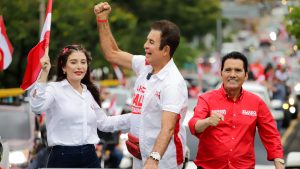In August, The Diplomat highlighted Honduras as the only former Taiwan ally openly considering a diplomatic reversal. Since then, the stakes have grown. Liberal Party frontrunner Salvador Nasralla has taken his pledge to restore Honduras’ ties with Taiwan to Washington. On a trip to the U.S. capital on September 18 to meet with both Democratic and Republican lawmakers, Nasralla gave an interview to the Honduran journalist Esdras Amado Lopez, in which he declared that he considers that China has given nothing to Honduras and called himself “a friend of the United States.”
At home, the issue has spilled beyond campaign rallies into parliamentary disputes over trips to Beijing, while in Washington Representative María Elvira Salazar (R-Florida) has introduced legislation to ensure international oversight of the vote. What was once a diplomatic question has now become a full test of China’s promises – and of Taiwan’s ability to reclaim space through the ballot box.
When President Xiomara Castro severed ties with Taipei in 2023, Honduras seemed destined to follow the regional pattern of countries switching to Beijing with little domestic debate. Yet unlike in Panama, El Salvador, or the Dominican Republic, foreign policy has become a serious campaign issue. What began as speculation about whether Taiwan might regain an ally has since escalated into open clashes between parties, congressional disputes, and legislation in Washington.
Earlier this year, the ruling Libre party organized a parliamentary delegation to China. The trip quickly exposed fractures: many legislators refused to attend, while National party members joined without their party’s permission. The episode revealed how Beijing’s courtship is testing not only Honduras’ economy but also its political institutions.
The backlash has roots in Honduras’ economy. The shrimp industry has collapsed since the rupture with Taiwan. Coffee producers and other agricultural exporters have fared little better. Meanwhile, Chinese imports have flooded local markets across the country with prices that make it impossible for local manufacturers to compete with. Honduran businesses have thus seen sinking sales.
Scholarships add another dimension. Around 170 Honduran students studying in Taiwan were left in limbo after the switch. Although their costs were eventually covered by the Honduran government, Beijing has offered only 27 new scholarships since 2023, a stark contrast with the 60 to 70 opportunities per year that Taipei once provided. For many families, this symbolized a government willing to gamble their children’s futures on promises that never materialized.
In September, the U.S. State Department announced new visa restrictions on Central American nationals “intentionally acting on behalf of the Chinese Communist Party” to undermine the rule of law” in the region. The measure sent a pointed signal to Tegucigalpa: Washington is prepared to punish elites who facilitate Beijing’s influence. For Nasralla, who has built his campaign around aligning Honduras more closely with the United States, the move validated his message that China has delivered little but risk.
The potential benefits of realignment with Washington are significant. Honduran officials have long sought the restoration of Temporary Protected Status (TPS) for the roughly 72,000 Hondurans living in the U.S. who lost protection this year when the Department of Homeland Security cited “improved conditions” at home. A government openly supportive of U.S. strategic priorities could argue for reinstatement, especially taking into consideration that the TPS for citizens of El Salvador, which has shown a lot more improvement in conditions, was extended until September 2026.
Similarly, Honduran exporters were affected by the 10 percent U.S. tariff on Honduran goods introduced this summer. A friendlier government in Tegucigalpa could lobby for preferential treatment in tariff negotiations, giving its producers a badly needed lifeline.
Nasralla has transformed economic grievances into a campaign weapon. By tying China’s trade imbalance and failed promises to job losses and inequality, he has reframed what is normally distant foreign policy into a question of local accountability. He argues that restoring ties with Taiwan is a way to rebuild rural jobs, strengthen Honduras’ international standing, and realign with Washington.
His pro-U.S. stance gained traction during his visit to Washington in September, where he met with members of both parties. In particular, his meeting with Representative Salazar drew attention from the Honduran media. Soon afterward, Salazar announced progress on her “Honduran Democracy Protection Act,” a bill that seems to have been inspired by her conversation with Nasralla. The proposal would mandate U.S. oversight of Honduras’ elections to prevent fraud, underscoring how closely Washington is now watching events in Tegucigalpa.
As news spread through Honduran media, former Honduran Minister of Foreign Affairs Eduardo Enrique Reina responded, accusing the U.S. of meddling in Honduran affairs.
Regardless of the outcome of the upcoming election, the vote carries broader meaning. If Hondurans endorse Nasralla’s call to return to Taiwan, it will mark the first time voters anywhere have reversed Beijing’s expansion at the ballot box. If they do not, it will suggest that even unmet promises are not enough to loosen China’s hold once recognition has shifted.
For Beijing and Taipei, the result in Honduras will echo far beyond Tegucigalpa. It will test whether China’s model of influence has lasting traction in Latin America – and whether Taiwan’s softer approach, rooted in education, trade, and people-to-people ties, can still generate momentum abroad. What The Diplomat framed in August as a possibility is now a live electoral test, with global implications for the balance of influence between Beijing and Taipei.





























